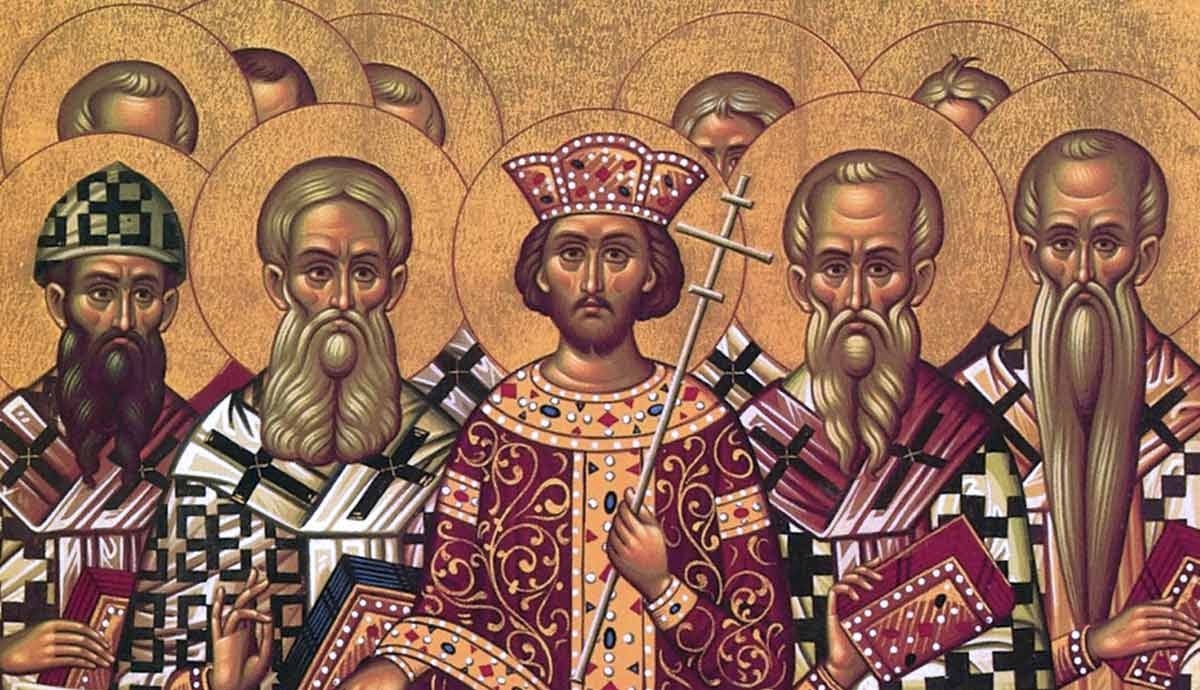Sunday of the Holy Fathers of the First Six Ecumenical Councils
Hebrews 13:7-16; John 17:1-13
Today the Church honors the Holy Fathers of the First Six Ecumenical Councils—those courageous bishops, theologians, and confessors who preserved the true faith of the Apostles in the face of heresy and division. They stood firm in times of enormous pressure, choosing exile, slander, imprisonment, and even death rather than compromise the truth about who God is and how He saves us by transforming our fallen nature through the Sacramental Mysteries of the Church.
The Fathers understood that if we lose sight of the truth of Christ and the Holy Trinity, we lose our hope of salvation.
Let me briefly recap the six Ecumenical Councils and the saints who defended orthodoxy during this period:
1. At Nicaea in 325, St. Athanasius the Great, though only a deacon, was the lead voice against the heresy of Arianism, which claimed that Christ was a creature, not God. The Council declared that the Son is homoousias—meaning of the same essence as the Father—true God from true God.
2. At Constantinople in 381, St. Gregory the Theologian defended the full divinity of the Holy Spirit against the Macedonians. The Council reaffirmed the Trinity—Father, Son, and Holy Spirit, co-equal and co-eternal.
3. At Ephesus in 431, St. Cyril of Alexandria battled Nestorianism, which denied that Mary is the Mother of God. The Church solemnly taught that Christ is one divine Person with two natures, and that Mary is rightly called Theotokos, the God-bearer.
4. At Chalcedon in 451, Pope St. Leo the Great’s Tome was read, which stated that Christ is one Person in two natures, fully God and fully man. This refuted the claim that Christ had only one (divine) nature.
5. At Constantinople in 553, the Church condemned lingering Nestorian writings and reaffirmed the unity of Christ’s Person.
6. Finally, in the 7th century, St. Maximus the Confessor was mutilated and exiled, and Pope St. Martin I was arrested and died in exile defending the truth that Christ has, not one will, but two wills—human and divine—the doctrine upheld at Constantinople in 681.
Why were they willing to suffer like this? Because Christ’s true nature had to be upheld. As St. Gregory of Nazianzus proclaimed: what Christ has not assumed cannot be redeemed. Only if Christ is truly God and truly man can we be united to God through Him and merit the hope of salvation.
Today’s epistle from Hebrews 13 calls us to “remember your leaders… imitate their faith… for Jesus Christ is the same yesterday, today, and forever.” The Fathers are those leaders. Their holy lives bore witness to the unchanging Christ they preached. The passage ends with reference to the Eucharistic altar and the sacrifice of praise—the very life of the Church that the Councils preserved.
In the Gospel of John 17, we hear Christ’s high priestly prayer: “Holy Father, keep them in your name… that they may be one, even as we are one.” This prayer was fulfilled through the Church’s response to heresy. The unity Christ prayed for is not mere sentiment, but unity in truth and love, which the Fathers safeguarded through the Councils.
And yet today, many of the same heresies have returned, under the umbrella heresy of Modernism. Relativism, for example, says all religions are equal—which is a denial of Christ’s divinity. New Age spirituality denies Christ’s humanity, reducing Him to a cosmic spiritual force. Moralistic Deism denies the Holy Spirit’s power, replacing divine grace with therapeutic sentimentality.
The Holy Fathers remind us that doctrine is not a dead letter, it is the light that guides our path, the truth that sanctifies our worship, and the armor of our salvation. At every Divine Liturgy, as we stand before the holy doors and recite together the Creed, I want you to imagine the holy angels clothing you with the armor of God for spiritual combat. Truth is our armor in the unseen battle.
May we, like the Council Fathers, love the truth more than comfort, and Christ more than the approval of the world.
Through their prayers, may we remain faithful to the One who is the only Way, the only Truth, and the only Life. Amen.



